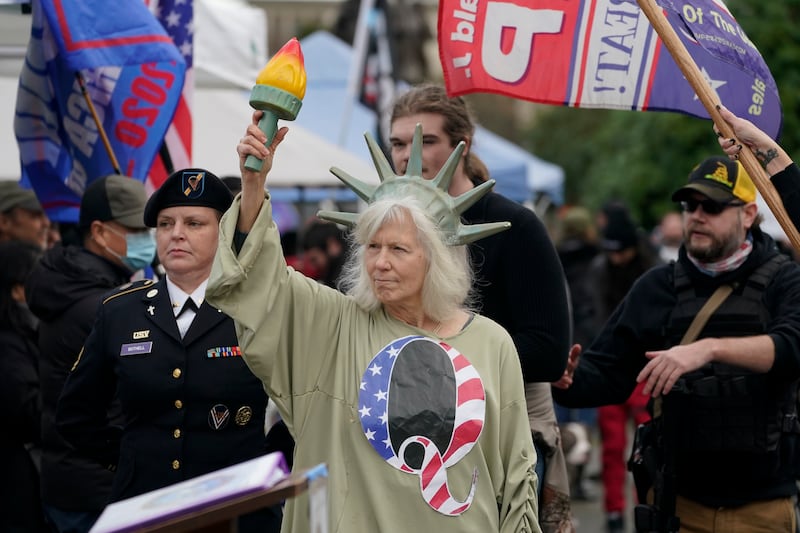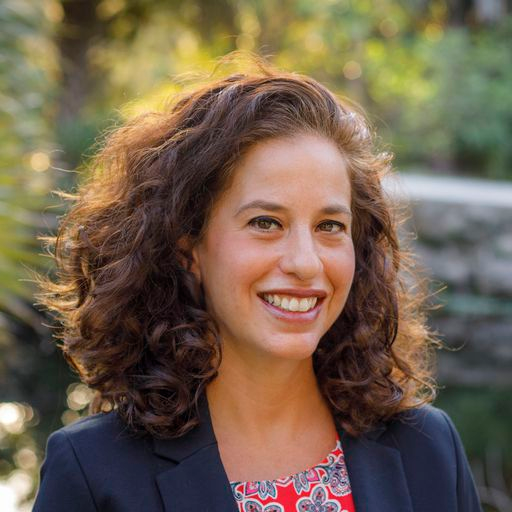When you think of someone who believes in conspiracy theories, who do you imagine? A loner, living in his parents’ basement, tapping away on a computer? If so, you need to expand your imagination — new research says there’s a good chance a conspiracy theorist is sitting next to you at church.
Around 4 in 10 religious Americans who are members of a local congregation believe the results of the 2020 election were not legitimate, according to the January 2021 American Perspectives Survey, a study conducted by the Survey Center on American Life, a project of the American Enterprise Institute based in Washington, D.C. Just under 1 in 5 accept the QAnon conspiracy theory that former President Donald Trump has been fighting a cabal of child sex traffickers led by Democrats and Hollywood elites.
Although white evangelicals seem to be particularly susceptible to conspiracy theories like these, they’re not the only people of faith who buy in. Eighteen percent of white Catholics and 15% of white mainline Protestants say QAnon’s claim about Trump is “mostly” or “completely” accurate, compared to 27% of white evangelicals, the survey showed.
The Rev. Mark Fugitt, who leads Round Grove Baptist Church in Miller, Missouri, and has been pastoring for 16 years, is one of many religious leaders who has noticed an uptick in conspiracy theory talk in their congregation.
In the past, he says he would occasionally hear from a congregant or two who held some unusual beliefs. But, in recent years, it’s happened more often.
“I would say we have a lot more people who are QAnon adjacent. They’re sharing content and repeating stories and they have no idea where they are from,” said the Rev. Fugitt, adding that the questions he gets from churchgoers “are rooted in fear.”
Members of his congregation have asked him when the Democrats are going to permanently shut down churches, a conspiracy that Trump shared on Twitter during the lead-up to the 2020 election. He’s also seen congregants circulating all kinds of conspiratorial content on Facebook, from the debunked idea that face masks are deadly to the false claim that George Floyd’s death was faked, as he told Religion News Service last year.
While many of the conspiracy theories religious Americans are buying into seem far-fetched, pastors and political experts emphasize that even the most outlandish ideas can have real-world consequences. As such, the phenomenon should be taken seriously and religious leaders should do their part to push back on such thinking, they say.
The Rev. Fugitt believes that while a majority of Christians do not attach themselves to conspiracy theories, the ideas are dangerous and can “rub off.”
“A little bit can go a long ways, and that’s why I think it must be addressed,” he said, adding that conspiracy theories hit at core teachings of Christianity, like loving your neighbor. “You can’t do that well if you’re giving them the side eye all the time,” said the Rev. Fugitt.

Fear, uncertainty and conspiracy theories
In explaining why people of faith embrace conspiracy theories, experts point out that their religion may not be the sole source of the problem. Politics plays a role in all of this, too, they say.
On the whole, Republicans are more likely to believe in conspiracy theories than Democrats, the survey showed. That’s significant because large shares of many white Christian faith groups identify as members of the GOP.
Still, white evangelical Republicans are more likely to buy into the sort of rhetoric peddled by QAnon than Republican counterparts who are not evangelicals, the January survey found. So there must be something about being religious, in general, and evangelical, in particular, that makes people susceptible to conspiracy theories, experts say.
It could be that belief in God paves the way for belief in other claims. Ed Stetzer, executive director of the Billy Graham Center at Wheaton College, recently shared that theory in a comment to FiveThirtyEight.
“People of faith believe there is a divine plan — that there are forces of good and forces of evil at work in the world. … QAnon is a train that runs on the tracks that religion has already put in place,” he said.
The anonymous person who goes by “Q” has made an overt appeal to the religious public by interlacing biblical content and conspiracy theories, the article noted.
“One week after his first drop, Q was already quoting scripture. ‘The LORD is my shepherd, I lack nothing,’ Q posted on the imageboard site 4chan. ... Is it any wonder that the fringe conspiracy theory QAnon has attracted true believers in every sense of the word?” FiveThirtyEight reported.
Religious Americans may also become susceptible to conspiracy theories when they grow anxious about the future. Belief in seemingly outlandish ideas can come “from feelings of fear and uncertainty, and a vague but strong desire to protect yourself and your group,” said Bruno Castanho Silva, a postdoctoral researcher at the University of Cologne’s Cologne Center for Comparative Politics.

Those same feelings helped fuel the recent surge in more violent expressions of Christian nationalism, as the Deseret News reported last month.
Castanho Silva believes that white evangelical Christians, in particular, are embracing conspiracy theories in part because of the “deep social and cultural changes” that have taken place in America in recent decades. While white evangelicals historically have had “the highest social status,” they’re now losing power, a shift that increases uncertainty and can cause them to latch on to conspiracist explanations, he said.
The Rev. Fugitt agrees that religious Americans turn to conspiracy theories out of fear. They arrive to QAnon and associated ideas “because they are searching” for comfort, he said.
Although this fear may be new, many of the conspiracy theories popping up in congregations today are not, according to the Rev. Fugitt and others.
QAnon represents a consolidation and repackaging of various fears and conspiracy theories that have attracted people for decades, if not centuries, said Joseph Uscinski, co-author of American Conspiracy Theories and a professor at the University of Miami.
“Those ideas predate QAnon. The problem is that QAnon adopted them,” said Uscinski.
The Rev. Fugitt said that, lately, he hears congregants repeating concerns about vaccines that have been part and parcel of the evangelical movement for the last 30 or 40 years.
And the myth that there’s a satanic ring of sex traffickers who are harming children has been around for millennia, according to Uscinski.
Asked about the persistence of that particular conspiracy theory, he explained, “If you’re going to accuse (opponents) of the worst possible thing, that’s it.”
Real-world consequences
Experts on religion and conspiracy theories emphasize that belief in the claims peddled by groups like QAnon has far-ranging consequences in the real world, impacting everything from public health and safety to politics.
For example, Castanho Silva notes that there is a close overlap between belief in conspiracy theories and support for populism, since both involve, among other things, a fundamental distrust of institutions.
Conspiracy theories about vaccines have complicated efforts to address the COVID-19 pandemic, the Rev. Fugitt said, noting that, in a town near his church, a vaccination site was nearly closed for lack of sign-ups.
“So many people around here bought into the different conspiracies early on,” he said.
While the ramifications of conspiracy theories related to public health are obvious, Daniel Cox, the author of the American Enterprise Institute study and director of the Survey Center on American Life, is quick to point out that even the most “far out” ideas can cause real life problems.
“Not too far from where I live where we had someone come to a local pizza place,” Cox said, referring to the gunman who entered Comet Ping Pong, a restaurant in Washington, D.C., because he believed Hillary Clinton was sexually abusing children in the (nonexistent) basement — a widely debunked conspiracy referred to as Pizzagate.
The Rev. Fugitt noted that his congregants seem to be trafficking less in conspiracy theories since social media platforms have taken action against disinformation.
However, the Rev. Fugitt said he is still trying to have “restorative conversations” with congregants who embrace conspiracy theories, talks that are “redemptive rather than judgmental.”
The key is “emphasizing (religious) virtues like loving your neighbor,” he said.


 alt=Mya Jaradat
alt=Mya Jaradat